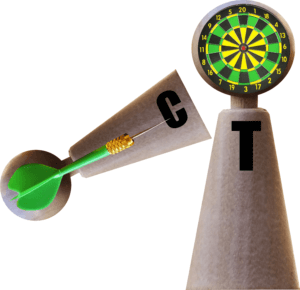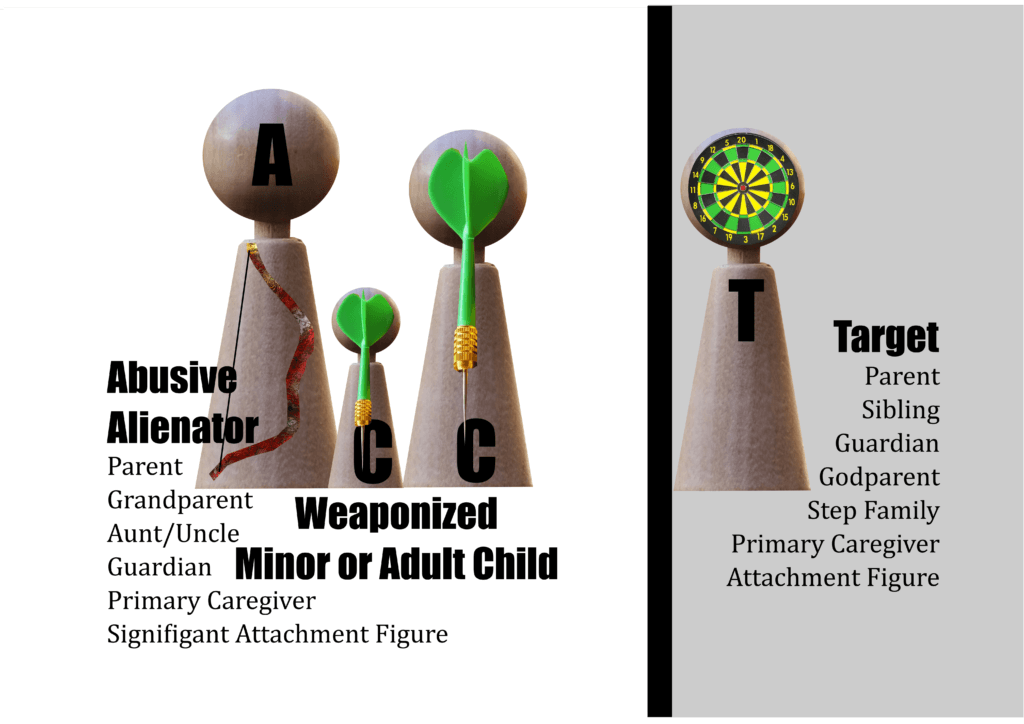Family Alienation
Trauma-Informed, Virtual
Coaching and Christian Counseling
Via Phone or Video Chat
What is Alienation?
While the legal and medical communities generally consider alienation when one parent successfully manipulates a child to reject the other parent, the reality is that alienation can occur in other relationships. Even non-custodial individuals can be the perpetrators and adult children the victims.
Alienation is a destructive and devastating type of abuse that occurs when a person successfully uses manipulative techniques to undermine a minor or adult child’s natural bonds to a family member or someone like a family member or parent. The child is weaponized and used to abuse the target. Both the child and the target are then victims of abuse.
"An alienator abuses a child (minor or adult) and the target. Alienation causes devastating traumatic impacts to the child and the target."

Who are the Players?
THE CHILD
a minor or adult
Minor and adult children can be victims of alienation. Sometimes the full impact of alienation doesn’t become apparent until a child becomes a young adult. The child is manipulated into being a weapon used against the target.
TARGET
a parent, family member, or someone who holds a parental or influential role in the CHILD’s life
Common targets of alienation are parents, grandparents, guardians, godparents, spiritual influences, siblings, extended family, etc. The abuser uses the child like an arrow to wound the target. Both the child and the target are typically traumatized from being used in this way.
ABUSIVE ALIENATOR
an attachment figure, family member, or parental figure in the CHILD’S life
Parents, grandparents, religious leaders, cults, aunts or uncles, teachers, boyfriends, girlfriends, or any important figures in the child’s life can perpetuate this type of abuse.
Narcissists notoriously employ this abusive technique to gain power and control over the child and the target.
SUPPORTERS
individuals who knowingly (malignant) or unknowingly participate in alienating the target.
For the target, the impact of the supporter’s actions is devastating. Often targets can’t comprehend how a supporter can participate in abusing the child and themselves.
Supporters can be manipulators themselves (malignant). Malignant supports use the child for their purposes, such as to gain attention, feel powerful and in control, or feed their entitlement. Often malignant supporters are jealous of the target’s relationship with the child, looking to build a supportive fan club around them, or running a smear campaign against the target.
Malignant supporters often employ incredibly covert manipulations. These manipulations can result in the malignant supporters appearing to the child and outsiders to be more loving, caring, and supportive than the Target. Worse yet, the manipulations by a malignant supporter can make the target appear to be the primary problem and even the abuser.
Examples of Family Alienation
A father (Alienator) weaponizes his 20 year old son (Child) to alienate his mother (Target).
A mother (Alienator) weaponizes her step daughter (Child) to alienate her father (Target).
The daughter (Alienator) uses her son (Child) to alienate the grandfather (Target).
A sister (Malignant Supporter) supports her niece’s boyfriend (Alienator) in weaponizing her (Child) to alienate her family (Targets).
"The Abusive Alienator Weaponizes the Child and Aims Them at the Target."

The Abusive Alienator's Battle Plan

Covert Operations
Covert alienation is difficult for the target, the child, and outsiders (even professionals) to detect. Covert narcissists are exceptionally skilled at “flipping the script.” They convincingly portray themselves as the victim (target) of mistreatment by the actual target.
For example, “Let’s not tell your mom about that. You know how easily she gets upset, and we don’t want to stress her out even more.” This manipulates the child into viewing their mother as too weak to help them with their emotional needs leaving them feeling unsafe and unsupportive. The result is that the child will protect themselves from the target who in their perception, is far too unstable and unreliable to depend on. The child will then try to attach the alienator even more, who they see is better suited to meet their needs.
Painful and Harmful Beliefs
- Alienation often causes the target to believe falsely:
- If I were more (fill in the blank), the child would stop rejecting me.
- This rejection must be caused by something I’m not doing right.
- The alienator and supporters must misunderstand my intentions.
- It’s my fault because of how I’ve reacted.
- Since the child, the alienator, and the supports see it the same way, I must be the one doing something wrong to cause this.
- My relationship issues with the alienator are causing my problems with the child.
Are You Experiencing Any of These Impacts of Alienation?
-
waves of intense pain and grief
-
feeling empty, restless, hopeless, and questioning your purpose now
-
endlessly feeling confused and trying to make sense of things
-
frequently plagued by regret and guilt
-
often feeling irritable or angry
-
shame about how much of your energy this relationship absorbs
-
constantly feeling depressed, anxious, and restless
-
feeling like your mind defaults to thinking about it all the time
-
having intense, unpredictable emotions that are difficult to calm
-
having difficulties with sleeping, eating, and self-care
-
difficulty doing things because nothing feels pleasurable anymore
-
periods of feeling numb or disconnected from life
-
difficulty thinking clearly or making plans
Loneliness and intense feelings of not being heard or understood go hand in hand with alienation. The responses from even well-meaning people can leave victims of alienation feeling invalidated and hopeless.
Do You Need?

Answers
Are you constantly confused and questioning everything?
Get the validation and insights you need to unravel your individual situation and clearly understand the truth about what is happening.

Direction
Have you tried everything, but nothing seems to be helping?
Get the personalized guidance, effective strategies, and roadmap you need to confidently choose your next steps.

Healing
Are you realizing just how deeply you have been impacted?
Get the trauma-informed support and direction you need to overcome the impacts and move forward in your life.
Services
My Approach
I believe we are all beautifully unique, including YOU, so a “one size fits all” approach often isn’t helpful and can even be hurtful. So, instead of using a cookie-cutter plan, I enjoy working together with you to create a path forward that considers your unique personality, challenges, and strengths.
I believe that you are the expert on you. My role is to listen and learn about you so that I can provide the guidance and support you need to get to where you want to go. The best growth and healing occurs in a space where you feel free to ask questions, disagree, and talk about what is helpful and what isn’t.
I believe every person is valuable. Unfortunately, trauma often causes us to confuse the impacts of trauma with our identity. When this happens, we are left feeling deeply ashamed, hopeless, crazy, and weak. I value you, and I want to create a safe space where you can feel and know your value too!
Important!
Willow Life Coaching and Counseling, LLC does NOT provide medical services. Please see a licensed medical provider if you need medical and mental health services.
About Me

Bonnie Ronstrom
I’m a certified life coach, victim’s advocate, and pastoral counselor. I specialize in walking toward healing with those harmed by toxicity, narcissism, and spiritual abuse.
My passion is to provide the validation, support, training, and resources individuals and organizations need to overcome the devastating impacts of toxicity and abuse.
Whether you need a one-time consult or a place to heal, I look forward to meeting you and exploring how we can best work together. I work with clients from all over the world through virtual, trauma-informed coaching, Christian counseling (non-medical), groups, training, and consulting services.
Specialties
Select One to Learn More
Contact Me
Frequently Asked Questions

Who do you work with?
I work with English speaking adults from diverse cultures, countries, and backgrounds.

What forms of payment do you take?

Do you take insurance?
My services are not medical, so they are not covered by medical insurance.
If you didn’t see an answer to your question, the link below will take you to more frequently asked questions.
What does working together look like?
The various parts of us (body, mind, soul, spirit, emotions, personality, abilities, etc.) are so intricately woven together that all aspects of us are impacted when we experience hardships and trauma. For this reason, I believe the most profound growth and healing occur when all parts of us are part of the process.
When we first meet, I’ll ask about your goals and what you hope to gain from working together. Some people have a clear picture of what they want, while others are overwhelmed and focused on surviving today (an expected impact of abuse and trauma). If this is your situation, we can start with your immediate needs, such as helpful information, clarity, a safety plan, or strategies to calm the chaos and anxiety.
I let each person decide how often they want to meet (permitting time in my schedule) and if they prefer to meet via phone or video chat.
As we talk, I discover your personality, experiences, preferences, and abilities. Getting to know you is an essential part of helping me present options and strategies that will be effective for you. I don’t believe a one-size-fits-all approach works.
Part of being trauma-sensitive is that I’m always listening for potential triggers and roadblocks so that together we can develop creative ways to help you keep moving forward and avoid being retraumatized.
Trauma alters how our brain and nervous systems function. Even when we are no longer in a harmful environment, having “trauma brain” causes physical problems and makes everyday tasks and interactions difficult. An essential part of healing is helping your brain and nervous systems return to healthy functioning. Thankfully, our brains are capable of changing and developing new patterns. Even though trauma is devastating, healing is possible!
People are traumatized when they go through deeply distressing events. When these distressing events are ongoing (such as in the case of Narcissistic Abuse), the impacts are profound.
When there is stress, our brains temporarily change how they function to help us respond to the stressor and recover afterward. Prolonged trauma causes our brains to take on new patterns of functioning. Certain brain areas become overactive while others under-function. These changes are sometimes referred to as “trauma brain.”
Here are just a few of the signs of “trauma brain.”
Lack of focus
Memory issues, Forgetful
Fatigue, Unmotivated
Anxious, restless
Emotionally reactive
Difficulty feeling connected to anyone
Difficulty thinking through challenging topics
More impulsive
Drawn toward addictions (food, shopping, drugs, researching, etc.)
Sleep difficulties
Loss of hope or difficulty thinking about the future
Jumpy
Overthinking & obsessing
Headaches, stomach and intestinal issues, auto-immune disorders
Skeptical of everyone and everything
